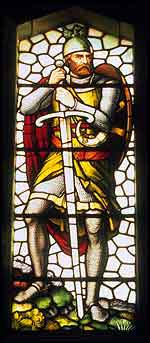If I hadn't been called to the pleasing vocation of marriage and childmaking, I'd be neck-deep in monkery by now. But to prove that it's not all beer and cheese, here is what is expected in a Benedictine Monastery:
from St. Benedict's Rule for Monasteries:
Chapter 4: What Are the Instruments of Good Works
1. In the first place, to love the Lord God with the whole heart, the whole soul, the whole strength.
2. Then, one's neighbor as oneself.
3. Then not to murder.
4. Not to commit adultery.
5. Not to steal.
6. Not to covet.
7. Not to bear false witness.
8. To respect all men.
9. And not to do to another what one would not have done to oneself.
10. To deny oneself in order to follow Christ.
11. To chastise the body.
12. Not to become attached to pleasures.
13. To love fasting.
14. To relieve the poor.
15. To clothe the naked.
16. To visit the sick.
17. To bury the dead.
18. To help in trouble.
19. To console the sorrowing.
20. To become a stranger to the world's ways.
21. To prefer nothing to the love of Christ.
22. Not to give way to anger.
23. Not to nurse a grudge.
24. Not to entertain deceit in one's heart.
25. Not to give a false peace.
26. Not to forsake charity.
27. Not to swear, for fear of perjuring oneself.
28. To utter truth from heart and mouth.
29. Not to return evil for evil.
30. To do no wrong to anyone, and to bear patiently wrongs done to oneself.
31. To love one's enemies.
32. Not to curse those who curse us, but rather to bless them.
33. To bear persecution for justice's sake.
34. Not to be proud.
35. Not addicted to wine.
36. Not a great eater.
37. Not drowsy.
38. Not lazy.
39. Not a grumbler.
40. Not a detractor.
41. To put one's hope in God.
42. To attribute to God, and not to self, whatever good one sees in oneself.
43. But to recognize always that the evil is one's own doing, and to impute it to oneself.
44. To fear the Day of Judgment.
45. To be in dread of hell.
46. To desire eternal life with all the passion of the spirit.
47. To keep death daily before one's eyes.
48. To keep constant guard over the actions of one's life.
49. To know for certain that God sees one everywhere.
50. When evil thoughts come into one's heart, to dash them against Christ immediately.
51. And to manifest them to one's spiritual father.
52. To guard one's tongue against evil and depraved speech.
53. Not to love much talking.
54. Not to speak useless words or words that move to laughter.
55. Not to love much or boisterous laughter.
56. To listen willingly to holy reading.
57. To devote oneself frequently to prayer.
58. Daily in one's prayers, with tears and sighs, to confess one's past sins to God, and to amend them for the future.
59. Not to fulfil the desires of the flesh; to hate one's own will.
60. To obey in all things the commands of the Abbot, even though he himself (which God forbid) should act otherwise, mindful of the Lord's precept, "Do what they say, but not what they do."
61. Not to wish to be called holy before one is holy; but first to be holy, that one may be truly so called.
62. To fulfil God's commandments daily in one's deeds.
63. To love chastity.
64. To hate no one.
65. Not to be jealous, not to harbor envy.
66. Not to love contention.
67. To beware of haughtiness.
68. And to respect the seniors.
69. To love the juniors.
70. To pray for one's enemies in the love of Christ.
71. To make peace with one's adversary before the sun sets.
72. And never to despair of God's mercy.
These, then, are the tools of the spiritual craft.If we employ them unceasingly day and night,and return them on the Day of Judgment,our compensation from the Lord will be that wage He has promised:"Eye has not seen, nor ear heard,what God has prepared for those who love Him."
Now the workshop in which we shall diligently execute all these tasks is the enclosure of the monastery and stability in the community.



